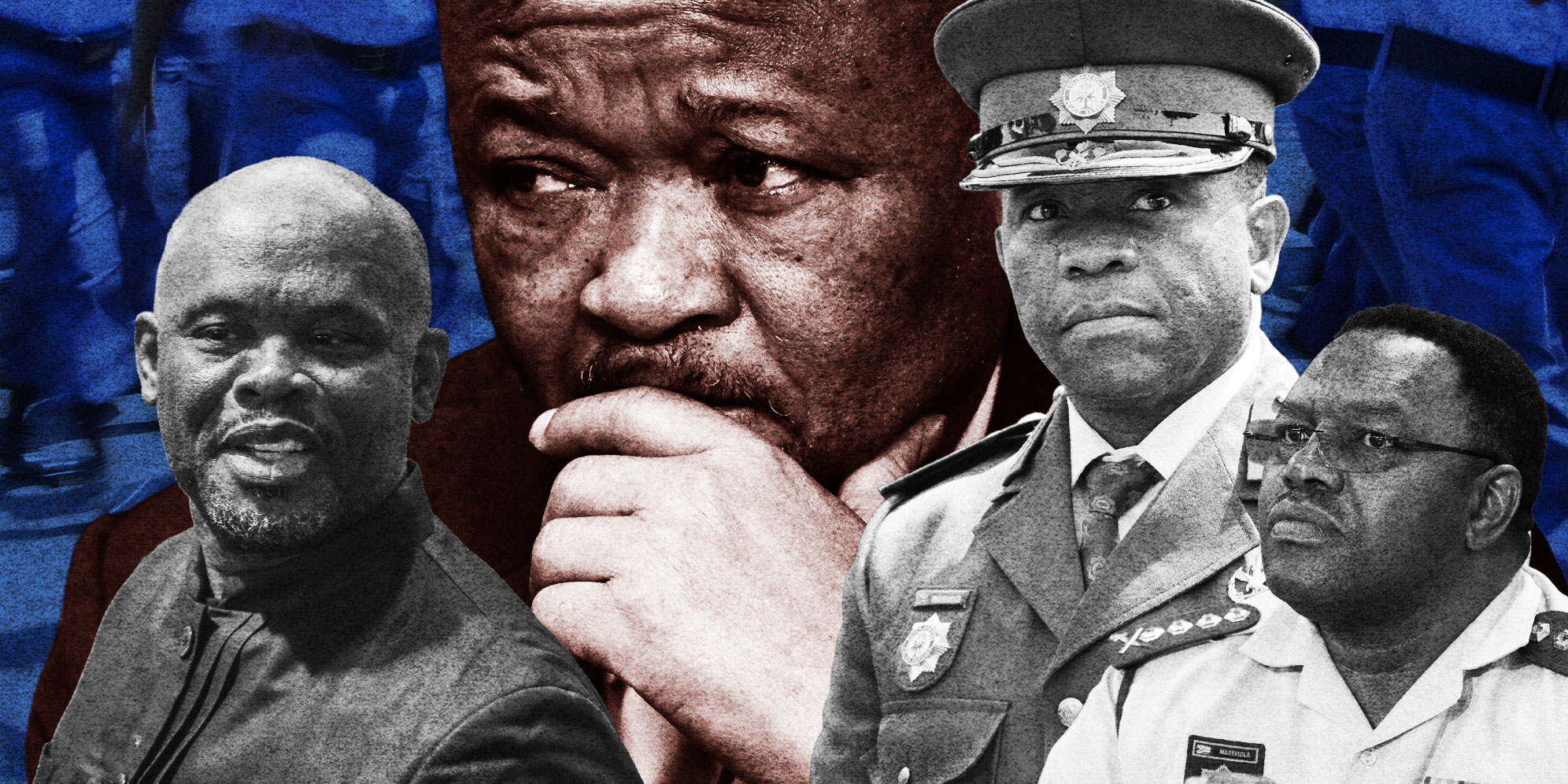A drug cartel with deep state links is calling the shots in South Africa’s law enforcement structures – this is the critical accusation that has rocked this arena for two months.
And now it is set for unprecedented scrutiny, with the public finally about to get a glimpse – if not a full-on view – of the real rot ravaging crime fighting in this country and gouging into our safety.
The Madlanga Commission of Inquiry into high-level accusations that KwaZulu-Natal police boss Nhlanhla Mkhwanazi made about two months ago is expected to start in Gauteng on Wednesday, 17 September 2025.
It marks a watershed moment for policing in democratic South Africa.
Mkhwanazi is to be its first witness.
The commission has a preliminary budget of R147.9-million, including R64-million for commissioners, evidence leaders and legal researchers, R4.9-million for support staff and R78.9-million for operational logistics.
At stake
Several sources with ties to policing have told Daily Maverick they hope that key corruption suspicions, which got lost in other scandals over several years, will now also be aired.
They include how certain top police officers apparently aligned themselves with – or offered “protection” to – organised crime suspects (some now murdered, others convicted), thereby influencing ructions stretching between provinces, including Gauteng and the Western Cape.
Follow live blog: Madlanga Commission kicks off in watershed moment for policing in democratic SA
These details, if confirmed, will provide clarity on how gangsterism, from white-collar crime to street-level shootings, has been fortified from within the state.
And this could ultimately mean several past and present police officers, along with other government officials, will face jail time.
President Cyril Ramaphosa ordered the creation of the Madlanga Commission after Mkhwanazi held a press conference on 6 July during which he made startling accusations.
These include that there was collusion between certain state figures and crime suspects, a drug cartel based in Gauteng was controlling a criminal syndicate with deep state links, and there were individuals with nefarious agendas in the country’s Crime Intelligence unit.
Sources have told Daily Maverick that it is obvious that his accusations, which exposed deep distrust in the already divided South Africa Police Service (SAPS), represent only a fragment of much broader corruption allegations.
Nevertheless, they say Mkhwanazi may have provided the momentum to finally expose those other issues – and unravel a tight knot of criminality that connects different sectors – from health and public transport, to private security.
Mkhwanazi’s key accusations are unpacked here, paired with developments. This shows the impact that Mkhwanazi’s words have already had in the two months since his explosive press conference – the run-up to the Madlanga Commission.
Read more: Inside Nhlanhla Mkhwanazi’s Document Zero, the cop who detonated SA’s policing crisis bomb
Political killings and enforced leave
One of Mkhwanazi’s most critical accusations was that, at the end of 2024, the police minister at the time, Senzo Mchunu, sent out a directive to disband KwaZulu-Natal’s political killings task team.
Mkhwanazi also alleged that in March 2025 the deputy national commissioner of crime detection, Lieutenant General Shadrack Sibiya, directed that “121 case dockets under investigation” be removed from the team.
This was allegedly done to protect certain crime suspects.
Mkhwanazi also claimed that Mchunu was in cahoots with “an associate”, Brown Mogotsi, who in turn was linked to crime accused Vusi “Cat” Matlala, who had been awarded a R300-million contract linked to police health services.
/file/dailymaverick/wp-content/uploads/2025/09/ED_557542.jpg)
Mkhwanazi claimed that “Matlala is financially supporting [Mchunu] and… Mogotsi’s political” endeavours.
Mchunu and Sibiya denied any wrongdoing, with Mchunu saying that Mogotsi was “just a comrade and not an associate”.
But Ramaphosa and national Police Commissioner Fannie Masemola appeared to be on Mkhwanazi’s side – or they took his allegations seriously.
Ramaphosa placed Mchunu on special leave, while Masemola told Sibiya he had to go on leave.
Sibiya tried unsuccessfully to overturn this via legal processes, but the situation escalated – last week, Masemola suspended Sibiya.
/file/dailymaverick/wp-content/uploads/2025/09/Presentation-170-1.jpg)
The 121 political killings dockets also became a point of contention.
Masemola, at the end of August, told journalists that the dockets had been traced to the police’s head office and would be returned to KwaZulu-Natal for investigation.
Read more: ‘You do your job, I’ll do mine’ — Cachalia, Masemola make amends over political murder dockets
Ramaphosa and acting police minister Firoz Cachalia, who was appointed to fill the position after Mchunu was placed on leave, felt Masemola was acting prematurely on issues the Madlanga Commission was meant to investigate.
This saga involved Ramaphosa effectively admonishing Masemola.
But it was ironed out about two weeks ago when it was decided that copies of the 121 dockets would be made and would be available to the commission if needed.
The actual dockets were returned to KwaZulu-Natal for investigation.
DJ Sumbody’s murder and arrests
Mkhwanazi, during his July press conference, referenced the April 2024 killing in Vereeniging of engineer Armand Swart, who was shot after the company he worked for unearthed corruption related to Transnet and tenders.
According to Mkhwanazi, when a suspect was arrested, “weapons used in the murder – an AK-47 and a pistol – along with cellphones, were confiscated”. (The suspect was former police detective Michael Pule Tau.)
A ballistics expert from the political killings task team had examined the firearms.
Mkhwanazi alleged that on 30 December last year the expert issued a ballistics report “which linked these firearms with a number of high-profile cases – including [the shooting of] high-profile South African artists – which occurred in Gauteng dating as far back as 2021”.
He had said that despite suspects being identified in those cases, prosecutors were inexplicably yet to act so that arrests could be made.
Mkhwanazi did not name the “high-profile South African artists”.
Daily Maverick previously reported that this probably included the November 2022 killing of Oupa John Sefoka, better known as DJ Sumbody, in Johannesburg.
About two weeks after Mkhwanazi’s press conference, four suspects were arrested in connection with Sefoka’s murder.
Among the four was Tau, the ex-policeman previously arrested in the Swart killing case.
‘Frozen’ Crime Intelligence and appointments
South Africa’s historically beleaguered Crime Intelligence unit inevitably fits into this scandal.
Daily Maverick reported that in March this year the SAPS warned Parliament that the unit’s national head at the time, Dumisani Khumalo, was being targeted for cleaning up the Crime Intelligence arena.
The targeting, Parliament heard, involved false accusations, including that he was appointing people aligned with him.
A SAPS presentation on this issue said: “The SAPS-Crime Intelligence was weakened over years and allegations of unlawful activities has been reported.
“Attempts to revive the division were made several times, but met with resistance because those that are unlawfully benefiting would obviously not support the changes.”
A few months later, in June, Khumalo was arrested along with six colleagues in connection with an allegedly irregular appointment.
They denied the accusations.
The Investigating Directorate Against Corruption (Idac), which falls under the National Prosecuting Authority, carried out the arrests.
During his July press conference, Mkhwanazi alleged that in the run-up to Khumalo’s detention, “members of Crime Intelligence released classified documents and handed them over to a member of Parliament”. (He did not name the MP.)
Mkhwanazi said the “classified documents” related to issues including vetting as well as covert properties.
He said the MP subsequently registered a criminal case in Gauteng and that Mchunu was allegedly approached and asked “to take these dockets and assign them to someone else”.
According to Mkhwanazi, the dockets ended up with Idac and he said its “investigating officer” apparently overseeing the case was a retired policeman – a former member of Crime Intelligence.
Read more: ‘No smear campaigning’ — Masemola warns Crime Intelligence management while filling unit vacancies
Mkhwanazi also alleged that on 31 December 2024 Mchunu issued a directive to freeze the filling of vacancies in the Crime Intelligence unit.
Here again it seems that Masemola backed Mkhwanazi, because days after the latter’s July press conference Masemola said that vacant senior posts were being filled in an acting capacity.
He also warned the country’s Crime Intelligence management not to get involved in smear campaigns – suggesting that this had happened in the past.
Drug trafficking and investigations
The Crime Intelligence scandal connects to Mkhwanazi’s overarching accusation.
He alleged that a drug cartel was controlling a high-level criminal syndicate in the country that extended into the police, the Police Ministry, Parliament, prison officials, the judiciary and other law-enforcement authorities.
The cartel, according to Mkhwanazi, was headquartered in Gauteng and was bringing in narcotics from South America.
Daily Maverick has reported extensively on drug trafficking, especially via Brazil and the Port of Durban, which is in Mkhwanazi’s province, KwaZulu-Natal.
There have long been suspicions of police involvement in this trafficking.
A case that stands out relates to a July 2021 consignment of cocaine, worth about R200-million, which was intercepted in Johannesburg. Four suspects were arrested.
According to their lawyer, they were Warrant Officer Marumo Mogana, a Crime Intelligence officer; Warrant Officer Steve Pakula, an Organised Crime Unit member; Samuel Mashaba, who was acting deputy director of Gauteng’s community safety department; and businessman Tumelo Nku.
The case against them was withdrawn.
Read more: R200m cocaine theft from KZN Hawks office may tie police to global drug traffickers
Investigations into this matter, however, continued.
Issues connected to the 2021 cocaine interception also pointed to developing divisions in the SAPS.
This is where Major General Feroz Khan, the head of counterintelligence and security at Crime Intelligence, crops up.
(During his July briefing, Mkhwanazi alleged that he once received a message from Brown Mogotsi, Mchunu’s “associate,” saying: “Gen Khan will brief u next week.” This implied that Mogotsi knew of certain issues relating to “Gen Khan.”)
Daily Maverick previously reported that Khan was accused of defeating the ends of justice and bringing the SAPS into disrepute over his presence at the 2021 cocaine interception.
But Khan, via court processes, countered that the Crime Intelligence head at the time, Khumalo, had used the interception to try to get rid of him because of his investigations into the abuse of secret funds, with possible links to Khumalo.
Meanwhile, police determined that the cocaine at the centre of that controversy had come from Brazil, arrived in KwaZulu-Natal and was transported to Gauteng.
This is the same drug trafficking route Mkhwanazi referred to during his July press conference.
While the police have not yet made any official statements about these specific drug accusations, Daily Maverick has since reported on attempts to push cocaine consignments from Brazil to Durban.
The drug trafficking accusations Mkhwanazi made are now among those expected to be analysed during the Madlanga Commission.
This means that South Africa might find out who exactly is accused of connecting this country to global narco conduits – arenas known for corrupting government officials around the world. DM





 Illustrative Image: Suspended Deputy National Police Commissioner Shadrack Sibiya. (Photo: Gallo Images / Phill Magakoe) | Minister of Police Senzo Mchunu. (Photo: Gallo Images / Frennie Shivambu) | KwaZulu-Natal Police Commissioner Lieutenant General Nhlanhla Mkhwanazi. (Photo: Gallo Images / Frennie Shivambu). | National Commissioner, General Fannie Masemola. (Photo: Gallo Images / Die Burger / Jaco Marais) | Police marching (Alet Pretorius)
Illustrative Image: Suspended Deputy National Police Commissioner Shadrack Sibiya. (Photo: Gallo Images / Phill Magakoe) | Minister of Police Senzo Mchunu. (Photo: Gallo Images / Frennie Shivambu) | KwaZulu-Natal Police Commissioner Lieutenant General Nhlanhla Mkhwanazi. (Photo: Gallo Images / Frennie Shivambu). | National Commissioner, General Fannie Masemola. (Photo: Gallo Images / Die Burger / Jaco Marais) | Police marching (Alet Pretorius)